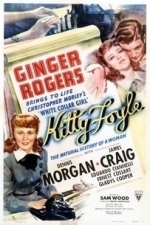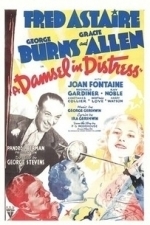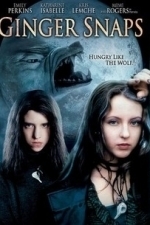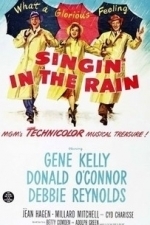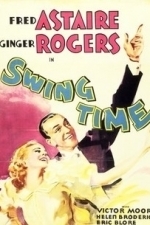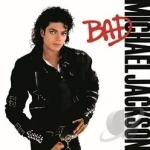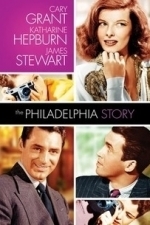Search
Search results
Karina Longworth recommended Kitty Foyle (1940) in Movies (curated)
R.L. Stine recommended A Damsel in Distress (1937) in Movies (curated)
LeftSideCut (3778 KP) rated Ginger Snaps (2001) in Movies
Mar 22, 2021
Ginger Snaps is certainly a product of it's time. A couple of decades later and it's so painfully 2000s, however, it still offers something fresh to the werewolf sub genre.
The allegory of burgeoning womanhood and simultaneously turning into a force of nature is an effective one, and is realised well, thanks to its well written characters and solid cast. Katharine Isabelle and Emily Perkins do a fantastic job in carving a realistic portrayal of sisterhood and a challenging time in life. Mimi Rogers is great on her supporting role as well.
For a film that has some potential to be silly, Ginger Snaps plays the whole ordeal pretty straight and sticks the landing for the most part. Nothing comes across as goofy.
There's plenty of impressive practical gore on display and some decent creature effects to top it all off.
This movie has a huge following for a reason, and although it's a little dated these days, it's still an enjoyable horror with a surprisingly emotional centre.
The allegory of burgeoning womanhood and simultaneously turning into a force of nature is an effective one, and is realised well, thanks to its well written characters and solid cast. Katharine Isabelle and Emily Perkins do a fantastic job in carving a realistic portrayal of sisterhood and a challenging time in life. Mimi Rogers is great on her supporting role as well.
For a film that has some potential to be silly, Ginger Snaps plays the whole ordeal pretty straight and sticks the landing for the most part. Nothing comes across as goofy.
There's plenty of impressive practical gore on display and some decent creature effects to top it all off.
This movie has a huge following for a reason, and although it's a little dated these days, it's still an enjoyable horror with a surprisingly emotional centre.
Neve Campbell recommended Singin' in the Rain (1952) in Movies (curated)
Phillip McSween (751 KP) rated Swing Time (1936) in Movies
Aug 14, 2020
Entertaining Despite Some Flaws
Fucking blackface, am I right? I’ll warn you now if you plan to watch Swing Time: There is a blackface scene. In spite of this touch of ignorance, as a black man, I have to say that I rather enjoyed the movie. The plot: When John Garnet (Fred Astaire) gets cold feet on his wedding day, his fiance opts to give him another chance if he can find a way to earn $25,000. John is all for it until he falls in love with a dance instructor and tries to find every way in the world to avoid making the money.
Acting: 10
Beginning: 6
In the beginning John’s dance troupe tries to distract him by keeping him from getting married. They feel like if he doesn’t go through with it, he can keep working with them. Despite their efforts, it was much more annoying than it was funny. Not a great way to kick off the story.
Characters: 10
Cinematography/Visuals: 8
For the most part, the movie is cinematically gorgeous. I loved the dance numbers, well most of them anyway. It all reverts back to that damn blackface scene. It was an unnecessary piece of the film that did absolutely nothing for the story. Other than that, the movie is shot in a gorgeous fashion.
Conflict: 10
Most of the conflict stems from John’s rising feelings for Penelope the dance instructor (Ginger Rogers). You get the sense that they are meant to be together but John is working towards trying to be with another woman. You hope before the story’s end that he ends up in the right place. It’s a journey getting there.
Entertainment Value: 8
Memorability: 10
Pace: 10
Plot: 2
The premise and the way it unfolds is a miss for me. Fortunately the characters and setpieces were enough to carry the movie. it was a really hard buy-in for me.
Resolution: 10
While not perfect, the ending is a satisfying completion to the story. You can definitely see it coming the closer you get, but it’s still good. Great closure for the main characters.
Overall: 84
Not my favorite of the classics, Swing Time still deserves its place in history. As far as the blackface is concerned, I think we owe it to ourselves not to shy away from things that happened in history. Even the bad things. In spite being on the wrong side of history, I enjoyed it.
Acting: 10
Beginning: 6
In the beginning John’s dance troupe tries to distract him by keeping him from getting married. They feel like if he doesn’t go through with it, he can keep working with them. Despite their efforts, it was much more annoying than it was funny. Not a great way to kick off the story.
Characters: 10
Cinematography/Visuals: 8
For the most part, the movie is cinematically gorgeous. I loved the dance numbers, well most of them anyway. It all reverts back to that damn blackface scene. It was an unnecessary piece of the film that did absolutely nothing for the story. Other than that, the movie is shot in a gorgeous fashion.
Conflict: 10
Most of the conflict stems from John’s rising feelings for Penelope the dance instructor (Ginger Rogers). You get the sense that they are meant to be together but John is working towards trying to be with another woman. You hope before the story’s end that he ends up in the right place. It’s a journey getting there.
Entertainment Value: 8
Memorability: 10
Pace: 10
Plot: 2
The premise and the way it unfolds is a miss for me. Fortunately the characters and setpieces were enough to carry the movie. it was a really hard buy-in for me.
Resolution: 10
While not perfect, the ending is a satisfying completion to the story. You can definitely see it coming the closer you get, but it’s still good. Great closure for the main characters.
Overall: 84
Not my favorite of the classics, Swing Time still deserves its place in history. As far as the blackface is concerned, I think we owe it to ourselves not to shy away from things that happened in history. Even the bad things. In spite being on the wrong side of history, I enjoyed it.
Natasha Khan recommended Bad by Michael Jackson in Music (curated)
BankofMarquis (1832 KP) rated The Philadelphia Story (1940) in Movies
Sep 14, 2019
It's as good (maybe better) than you've heard
We all know of movies that you hear are considered a "classic", but you've never seen, and the few clips of the film you've seen does not, exactly, motivate you to check out the entire film. THE PHILADELPHIA STORY was one such film for me. This 1940 George Cukor production is lauded for it's dialogue, direction and the stellar performances of the cast - particularly the 3 leads, Katherine Hepburn, Cary Grant and Jimmy Stewart.
Recently, I attended our monthly "Secret Movie Night" where we pack the Willow Creek Movie Theater on the 2nd Thursday of every month and get treated to a "Classic" Film (made before 1970) or a "New Classic" (made after 1970), but we don't know what the film is until it starts playing on the screen.
So...imagine how much my eyes rolled back into my head when I saw that this month's film was the aforementioned THE PHILADELPHIA STORY. I sighed to myself and said "all right, time to endure this one all the way through."
And...I couldn't have been more wrong. Almost from the start the script, pacing and witty dialogue of this Broadway-Play-Turned-Movie swept me away. Most certainly aided by the fact that 3 of the best movie stars of all time - at the peak of their abilities - were letting this wonderful dialogue roll off their tongues. This film is a "classic" in every sense of the word.
The plot is...inconsequential. Basically...Philadelphia socialite Tracy Lord (Hepburn) is getting remarried. Her ex-husband (Cary Grant) enlists the aid of a Journalist (Jimmy Stewart) to create havoc at the wedding.
But...this is a film where the journey, not the destination, is the fun of the flick. The 3 leads banter back and forth with each other, arming and disarming (and charming) one another with their quick wit and biting criticism. The Broadway Stage play was written, specifically, for Hepburn and she exceeds in this role. Here is a newsflash - KATHERINE HEPBURN IS A VERY GOOD ACTRESS - and I think this is the very best performance of the very best actress of all time (with apologies to Meryl Streep). She was nominated (but did not win) the Oscar for Best Actress for her performance (losing to a very deserving Ginger Rogers in KITTY FOYLE, I would have voted for Hepburn, but gotta give Rogers her due, she is very good as the titular KITTY FOYLE).
Stepping up to the plate - and matching Hepburn blow for blow - is, surprisingly, Stewart. I didn't really know the story of this film, so I was surprised where Stewart's character-arc went, especially in relation to his relationship with Hepburn. Stewart lost the Oscar in 1939 for his bravura performance in MR. SMITH GOES TO WASHINGTON (inexplicably losing to Robert Donat in GOODBYE MR. CHIPS), so the Academy made up for it's mistake by awarding Stewart the Oscar for Best Actor of 1940. This most certainly was a worthy Oscar-winning performance, but (if I"m going to be honest), pales in comparison to his work in MR. SMITH...
Looming over these two (and Tracy's impeding marriage to another person) is Cary Grant as Tracy's ex-husband, C.K. Dexter Haven. While Grant's role is the least showy of the 3, he commands the screen just with his presence whenever he shows up and strengthens this triangle with his strength of character.
The supporting cast is just as strong - Ruth Hussy (Oscar nominated for Best Supporting Actress) as a photographer, Roland Young (as the lecherous Uncle Willy) and, especially, 13 year old Virginia Weidler who is spunky, fun and smart as Tracy's kid sister. The only performer relegated to the back of the scenery is the bland John Howard as George Kittredge (the man Tracy is slated to marry). With Grant and Stewart on the scene, you know that Kittredge has no shot at getting Tracy Lord to the altar (or does he?).
All of these fine actors and the wonderful dialogue were put into the hands of the great Director George Cukor - who had 1 of his 5 Best Director Oscar Nominations for this film (he will win for MY FAIR LADY in 1964). He handles this film with skilled hands letting the actors (and the dialogue) "do their thing" without letting any of them overstay their welcome. It is a masterful job of directing and with strong actors (and off-screen personalities) like Hepburn, Grant and Stewart, he had his hands full.
Sure...it's a 1940's movie, so some of the "social situations" (mostly male/female dynamics) do not age particularly well, but Hepburn was a strong personality - certainly well ahead of the game in terms of equality of strength of the sexes, so these dynamics do not jump at us as strongly as it might have been in a lesser actress's hands.
If you haven't seen this film in sometime (or if you haven't seen it at all) - check out THE PHILADELPHIA STORY - you'll be glad you did.
Letter Grade: A+
10 (out of 10) stars and you can take that to the Bank(ofMarquis)
Recently, I attended our monthly "Secret Movie Night" where we pack the Willow Creek Movie Theater on the 2nd Thursday of every month and get treated to a "Classic" Film (made before 1970) or a "New Classic" (made after 1970), but we don't know what the film is until it starts playing on the screen.
So...imagine how much my eyes rolled back into my head when I saw that this month's film was the aforementioned THE PHILADELPHIA STORY. I sighed to myself and said "all right, time to endure this one all the way through."
And...I couldn't have been more wrong. Almost from the start the script, pacing and witty dialogue of this Broadway-Play-Turned-Movie swept me away. Most certainly aided by the fact that 3 of the best movie stars of all time - at the peak of their abilities - were letting this wonderful dialogue roll off their tongues. This film is a "classic" in every sense of the word.
The plot is...inconsequential. Basically...Philadelphia socialite Tracy Lord (Hepburn) is getting remarried. Her ex-husband (Cary Grant) enlists the aid of a Journalist (Jimmy Stewart) to create havoc at the wedding.
But...this is a film where the journey, not the destination, is the fun of the flick. The 3 leads banter back and forth with each other, arming and disarming (and charming) one another with their quick wit and biting criticism. The Broadway Stage play was written, specifically, for Hepburn and she exceeds in this role. Here is a newsflash - KATHERINE HEPBURN IS A VERY GOOD ACTRESS - and I think this is the very best performance of the very best actress of all time (with apologies to Meryl Streep). She was nominated (but did not win) the Oscar for Best Actress for her performance (losing to a very deserving Ginger Rogers in KITTY FOYLE, I would have voted for Hepburn, but gotta give Rogers her due, she is very good as the titular KITTY FOYLE).
Stepping up to the plate - and matching Hepburn blow for blow - is, surprisingly, Stewart. I didn't really know the story of this film, so I was surprised where Stewart's character-arc went, especially in relation to his relationship with Hepburn. Stewart lost the Oscar in 1939 for his bravura performance in MR. SMITH GOES TO WASHINGTON (inexplicably losing to Robert Donat in GOODBYE MR. CHIPS), so the Academy made up for it's mistake by awarding Stewart the Oscar for Best Actor of 1940. This most certainly was a worthy Oscar-winning performance, but (if I"m going to be honest), pales in comparison to his work in MR. SMITH...
Looming over these two (and Tracy's impeding marriage to another person) is Cary Grant as Tracy's ex-husband, C.K. Dexter Haven. While Grant's role is the least showy of the 3, he commands the screen just with his presence whenever he shows up and strengthens this triangle with his strength of character.
The supporting cast is just as strong - Ruth Hussy (Oscar nominated for Best Supporting Actress) as a photographer, Roland Young (as the lecherous Uncle Willy) and, especially, 13 year old Virginia Weidler who is spunky, fun and smart as Tracy's kid sister. The only performer relegated to the back of the scenery is the bland John Howard as George Kittredge (the man Tracy is slated to marry). With Grant and Stewart on the scene, you know that Kittredge has no shot at getting Tracy Lord to the altar (or does he?).
All of these fine actors and the wonderful dialogue were put into the hands of the great Director George Cukor - who had 1 of his 5 Best Director Oscar Nominations for this film (he will win for MY FAIR LADY in 1964). He handles this film with skilled hands letting the actors (and the dialogue) "do their thing" without letting any of them overstay their welcome. It is a masterful job of directing and with strong actors (and off-screen personalities) like Hepburn, Grant and Stewart, he had his hands full.
Sure...it's a 1940's movie, so some of the "social situations" (mostly male/female dynamics) do not age particularly well, but Hepburn was a strong personality - certainly well ahead of the game in terms of equality of strength of the sexes, so these dynamics do not jump at us as strongly as it might have been in a lesser actress's hands.
If you haven't seen this film in sometime (or if you haven't seen it at all) - check out THE PHILADELPHIA STORY - you'll be glad you did.
Letter Grade: A+
10 (out of 10) stars and you can take that to the Bank(ofMarquis)
